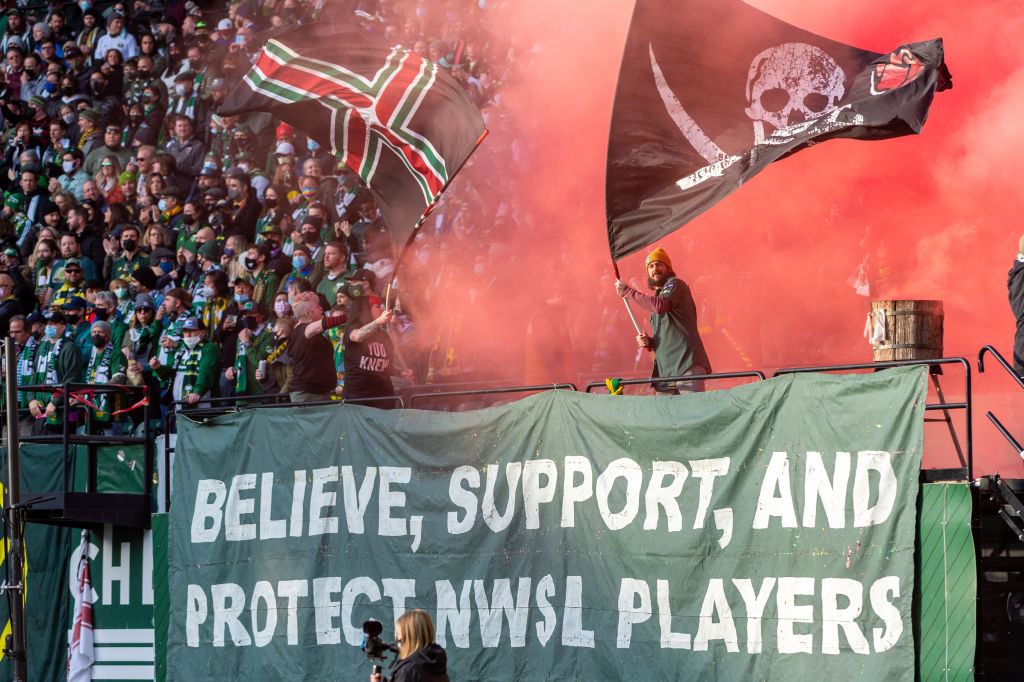For the past year, former deputy attorney general Sally Yates has been leading an investigation into the NWSL. She was hired by the league to conduct this investigation after The Athletic and The Washington Post reported on allegations of sexual misconduct and verbal abuse that had been made against NWSL coaches. These reports and others concerning misconduct within the league led to a reckoning of sorts. A weekend's slate of games were called off last October, and the players demanded better protections from the league. Yates's full report was published today. It confirms much of what was already reported in the media, while also providing new details of abuse and describing the institutional failures that allowed such abuse to go unchecked for so long.
"Our investigation has revealed a league in which abuse and misconduct—verbal and emotional abuse and sexual misconduct—had become systemic, spanning multiple teams, coaches, and victims," the investigators write at the beginning of the report. The report's executive summary concludes that this systemic rot was allowed to take hold for a few reasons, one of them being the fact that the NWSL and its governing body, the USSF, failed to provide even the most basic workplace protections to its employees. Instead of doing things like establishing basic HR services and coherent anti-harassment protocols, those in charge of the NWSL were solely focused on keeping the financially insecure league in operation. From the report:
Verbal and emotional abuse and sexual misconduct were widespread problems in women’s soccer prior to the NWSL, in both prior women’s professional leagues and even elite youth soccer. Fraternization—between players, players and coaches, and players and staff—was common. The NWSL’s predecessor league—Women’s Professional Soccer (“WPS”)—had failed amidst legal battles with an owner who reportedly bullied and threatened players. But despite this backdrop, the NWSL was not set up with these concerns in mind.
The new League (through the owners who governed it) and the Federation (which acted as its Manager) failed to take any steps to protect players from these problems. They did not institute the most basic of workplace protections. For most of the League’s history, there was no anti-harassment policy, no anti-retaliation policy, and no anti-fraternization policy. Nor were there independent reporting lines, coaching codes of conduct, or any guidelines regarding the due diligence necessary to hire a coach. Most teams did not have human resource functions, and if they did, some teams did not believe those services were available to players. Until the NWSL instituted an anti-harassment policy in 2021—at the players’ insistence—the League held only two workplace harassment trainings. Ultimately, teams, the League, and the Federation gave little thought or attention to basic player protections. The focus was keeping eight teams on the field to ensure the League’s survival.
The report also provides new details about the conduct of Christy Holly, who left his position as head coach of the Sky Blue in 2017 under a cloud of scrutiny, and was fired for cause in 2021 by Racing Louisville, where he had been the head coach for only a year. At the time, nothing was publicly reported about why Holly was fired, but Yates and her investigators discovered what actually led to his dismissal. According to the report, Holly sexually coerced one of his own players, Erin Simon. The report states that in one instance he invited Simon to his home to review game film, showed her pornography instead, and began masturbating in front of her. The report also says that he sent sexually explicit photos and messages to Simon, and in another incident invited Simon over to watch game film before proceeding to grope her genitals every time she made a bad play on the film.
Aside from Holly, the report focuses on the abuse allegations against Paul Riley, who last coached the North Carolina Courage, and Rory Dames, who last coached the Chicago Red Stars. One failure that the report zeros in on is how all three coaches were allowed to move around between different positions in the NWSL and USSF, even after their conduct had been reported to their teams. The report describes a culture of secrecy and unaccountability, maintained by NDAs and a culture of silence, that allowed abusive coaches to continue finding work despite serious accusations being made against them. From the report:
Even where the Federation and/or the League was aware of the misconduct, it typically did nothing to correct the team’s inaccurate description or minimized the coach’s misconduct. For example, the Portland Thorns, the Federation, and the League failed to ensure Riley’s conduct was accurately disclosed to Western New York Flash or North Carolina Courage. When the Courage reached out to Gulati regarding Riley in connection with their purchase of the team, Gulati simply referred the Courage to the Thorns, although he was informed that Portland Thorns GM Wilkinson had told Western New York that Riley “was put in a bad position by the player.”
In general, teams, the NWSL, and USSF appear to have prioritized concerns of legalexposure to litigation by coaches—and the risk of drawing negative attention to the team or League—over player safety and well-being. Certain teams also cloaked information about coach misconduct in attorney-client privilege, non-disclosure agreements, and non-disparagement clauses. For example, the Portland Thorns vigorously attempted to prevent our investigation from using the 2015 Thorns Report—which had been in USSF’s possession since 2015—on the grounds that it was protected by attorney-client privilege and common-interest privilege, despite all evidence to the contrary. Similarly, even as it terminated Christy Holly for cause, Louisville entered a mutual non-disclosure and non-disparagement agreement with Holly. The team insists that the NDA prohibits anyone associated with the team—even former employees—from speaking at all about Holly’s tenure with the team, including in connection with this investigation.
The full report, which is 316 pages and based on over 200 interviews, can be read here.






